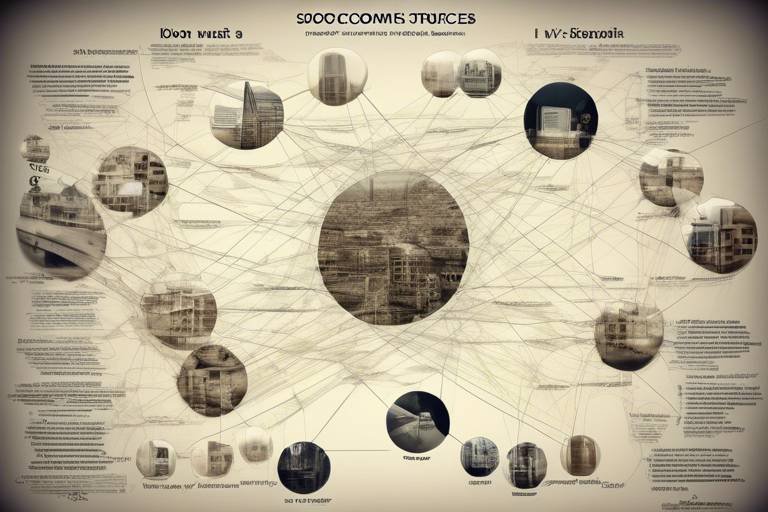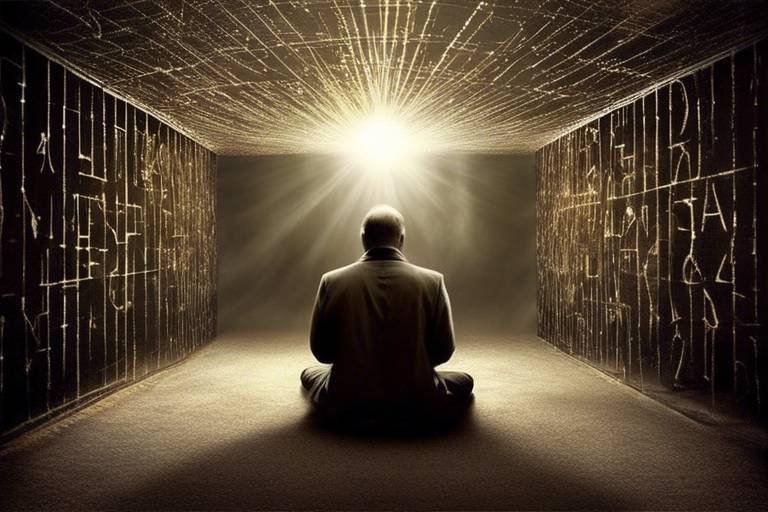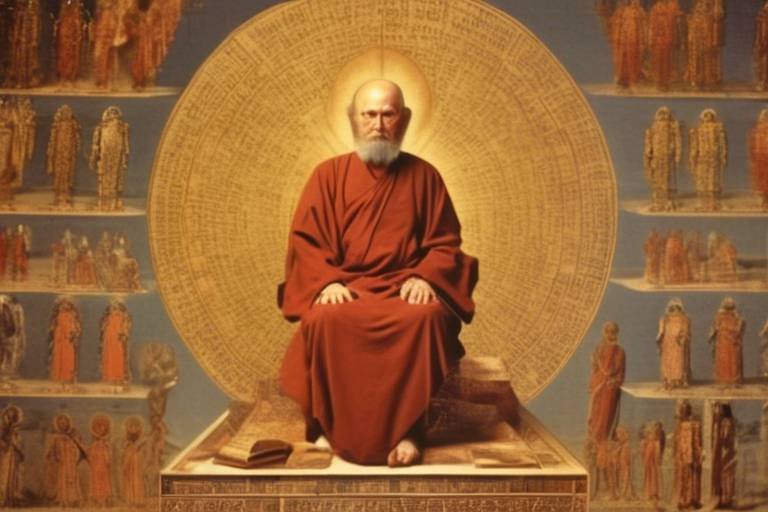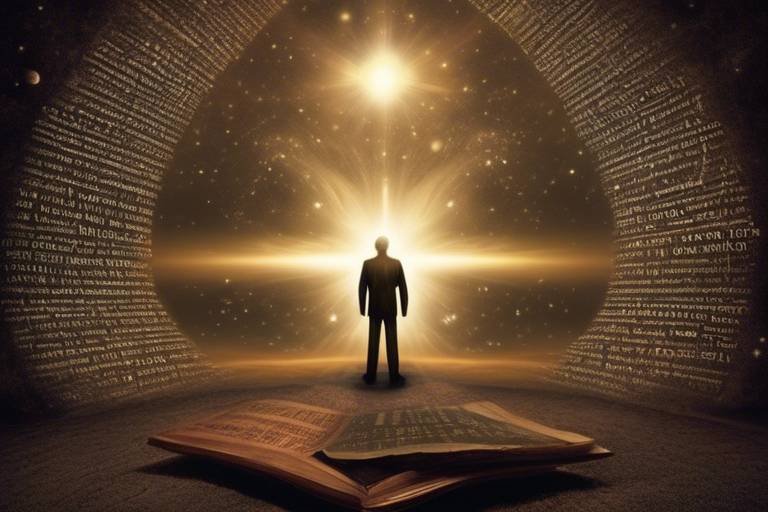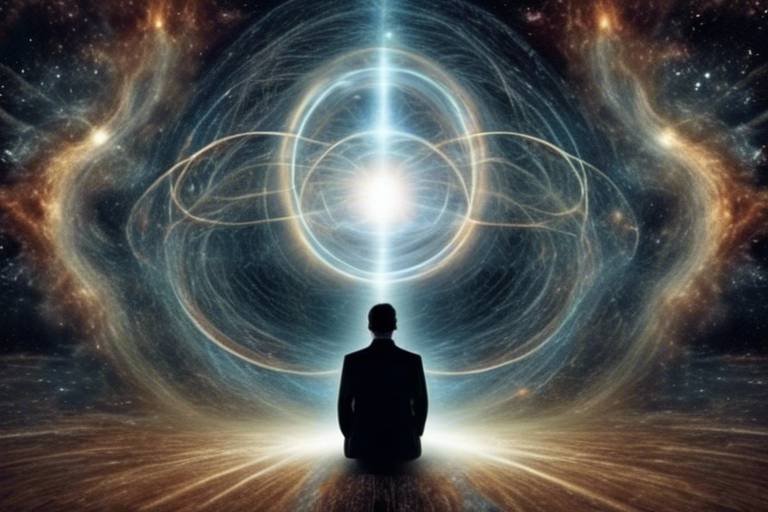Decoding the Metaphysics of Destiny and Free Will
Have you ever found yourself pondering the age-old question: are we the architects of our own fate, or are we simply puppets dancing to the strings of destiny? This intricate relationship between destiny and free will has captivated philosophers, theologians, and everyday thinkers for centuries. It’s like a cosmic dance where every step is influenced by both the music of the universe and our own choices. In this article, we’ll embark on a journey to explore these profound concepts, examining how they intertwine, clash, and ultimately shape our lives.
Destiny, often perceived as a predetermined path, has been interpreted in various ways across cultures and historical contexts. In ancient myths, destiny was often seen as something that was woven into the fabric of existence by divine beings or fate itself. For instance, the Greek concept of Moira, or fate, suggested that individuals were bound to a specific path that they could not alter. This perspective implies that no matter how hard we try, we cannot escape our destined outcomes. In contrast, other cultures, such as those influenced by Eastern philosophies, view destiny as a more fluid concept, where karma plays a significant role in shaping one’s life journey. Here, every action has a consequence, thus intertwining destiny with personal choices.
On the flip side of the coin lies free will, the belief that individuals have the power to make choices independent of any predetermined fate. This concept is crucial for understanding moral responsibility; after all, if we are merely following a script written by fate, can we truly be held accountable for our actions? Free will suggests that we are not just passengers on a predetermined journey but rather the captains of our ships, navigating through the vast ocean of life. This notion contrasts sharply with deterministic views, which argue that every action is the result of preceding events, leaving little room for personal agency.
The debate surrounding free will is rich and varied, with philosophers presenting compelling arguments both for and against its existence. Two prominent schools of thought are compatibilism and libertarianism. Compatibilists argue that free will and determinism are not mutually exclusive. They posit that even in a deterministic universe, individuals can still exercise free will in the sense that their choices align with their desires and motivations. This perspective allows for ethical decision-making, suggesting that individuals can still be held accountable for their actions. On the other hand, libertarians assert that true free will exists only when individuals can make choices that are not influenced by prior events. This belief emphasizes personal choice and autonomy, raising questions about how we define accountability in a world where some aspects may be predetermined.
Compatibilism provides a fascinating lens through which to view the coexistence of free will and determinism. Imagine a river: while its flow is determined by the landscape it traverses, it still has the freedom to meander, twist, and turn. In this way, compatibilism suggests that our lives may be influenced by external factors, yet we still possess the ability to make meaningful choices within those constraints. This understanding can significantly impact ethical decision-making, as it allows individuals to take responsibility for their actions while acknowledging the various forces at play.
In stark contrast, libertarianism posits that individuals possess genuine free will, emphasizing the importance of personal choice. This perspective is akin to standing at a crossroads, where each path represents a different outcome based on the decisions we make. Supporters of this view argue that if our choices are predetermined, then concepts such as praise, blame, and moral responsibility lose their significance. By advocating for the existence of free will, libertarians highlight the importance of accountability and the notion that we are ultimately responsible for our destinies.
Determinism challenges the very essence of free will, raising profound questions about moral responsibility and human behavior. If every action is predetermined, how do we navigate the complexities of life? This philosophical foundation suggests that our choices are merely the result of a chain of events, leaving little room for personal agency. Yet, this perspective can also offer comfort; understanding that our actions are influenced by a myriad of factors can foster compassion for ourselves and others, as we recognize the intricate web of circumstances that shape our lives.
So, how do destiny and free will coexist? This interplay is like a dance between two partners, each influencing the other's movements. While external factors may guide us along certain paths, our choices ultimately define our experiences. Understanding this balance can empower individuals to take charge of their lives, recognizing that while we may not control everything, we do have the ability to respond and adapt. This awareness can lead to profound personal growth, as we learn to navigate the complexities of our existence with intention and purpose.
Real-life examples abound that illustrate the complex relationship between destiny and free will. Consider someone who grows up in a challenging environment, facing numerous obstacles. While their circumstances may influence their trajectory, the choices they make—whether to pursue education, seek support, or engage in self-improvement—demonstrate the power of free will amidst adversity. These narratives remind us that while destiny may set the stage, it is our choices that ultimately shape the performance.
Understanding the dynamics of destiny and free will can be transformative. It encourages individuals to embrace their agency while acknowledging the external factors that influence their lives. This dual awareness fosters a sense of empowerment, prompting us to take proactive steps toward our goals. By recognizing that we hold the reins of our lives, we can cultivate resilience, adaptability, and a deeper understanding of ourselves and others.
- What is the difference between destiny and fate? Destiny refers to a predetermined path that can be influenced by individual choices, while fate often implies a fixed outcome that cannot be altered.
- Can free will exist in a deterministic universe? Yes, many philosophers argue that free will can coexist with determinism, allowing individuals to make choices within predetermined circumstances.
- How can understanding destiny and free will help in personal development? Recognizing the interplay between the two can empower individuals to take charge of their lives while being mindful of external influences, fostering personal growth and resilience.

The Nature of Destiny
Destiny, often perceived as a mystical force guiding our lives, has captivated human thought for centuries. What exactly is destiny? At its core, destiny refers to the idea that certain events or outcomes are predetermined, often by a higher power or the very fabric of the universe. This concept can evoke a sense of comfort or dread, depending on how one views their role within this grand scheme. Many cultures have woven the idea of destiny into their narratives, suggesting that life unfolds according to a script written long before we take our first breath.
Throughout history, various philosophical traditions have grappled with the nature of destiny. In ancient Greece, the Moirai, or Fates, were believed to spin the threads of human lives, weaving destinies that no mortal could alter. Similarly, in many Eastern philosophies, such as Hinduism and Buddhism, the concept of karma plays a crucial role in shaping one's destiny, suggesting that our actions in past lives influence our current circumstances.
In modern times, the interpretation of destiny has evolved. Some view it as a deterministic path, where every choice and event is preordained, while others see it as a flexible framework within which we exercise our free will. Is destiny a rigid blueprint or a dynamic map? This question lies at the heart of the ongoing debate about human agency and the extent to which we control our lives.
Interestingly, the concept of destiny can also be contrasted with the notion of chance. While destiny suggests a predetermined outcome, chance introduces an element of randomness that can alter our paths in unexpected ways. For instance, consider a person who dreams of becoming a musician. They may believe it is their destiny to perform on stage, yet a chance encounter with a talent scout can dramatically change the trajectory of their life. This interplay between destiny and chance creates a rich tapestry of human experience, where fate and free will dance together in a complex rhythm.
To further illustrate the various interpretations of destiny, let’s look at how different cultures perceive this concept:
| Cultural Perspective | Interpretation of Destiny |
|---|---|
| Greek Mythology | Life is predetermined by the Fates, who control the thread of life. |
| Hinduism | Karma influences destiny, with past actions determining present circumstances. |
| Christianity | God has a plan for each individual, guiding them towards their destined path. |
| Buddhism | Destiny is shaped by one’s actions and intentions, promoting personal responsibility. |
This table highlights the diversity of thought surrounding destiny, revealing how cultural narratives shape our understanding of fate. Ultimately, the nature of destiny invites us to ponder profound questions about existence, purpose, and the balance between forces beyond our control and our own choices.
As we delve deeper into the intricate relationship between destiny and free will, it becomes clear that understanding destiny is not just about accepting a predetermined fate. It is about recognizing the myriad influences that shape our lives and how we can navigate them. So, while destiny may set the stage, it is ultimately up to us to perform our roles, making choices that reflect our values, desires, and aspirations.

The Concept of Free Will
Free will is a term that dances on the tongue of philosophers, theologians, and everyday folks alike. But what does it really mean? At its core, free will refers to the ability of individuals to make choices that are not predetermined by prior causes. Imagine standing at a crossroads, where each path represents a different choice. Free will is the power to choose which path to take, regardless of the influences that may push you in one direction or another.
Historically, the concept of free will has been a hot topic of debate. Think of it as a double-edged sword—on one side, it empowers us with the belief that we are the architects of our own destinies; on the other, it raises questions about moral responsibility. If we are truly free to choose, then we must also bear the weight of our decisions. This idea can be both liberating and daunting. Are we to be celebrated for our triumphs, or condemned for our failures? This tug-of-war between freedom and responsibility is what makes the discussion of free will so captivating.
Moreover, in a world that often feels chaotic and unpredictable, the idea of free will provides a sense of control. When life throws curveballs, the belief that we can choose our responses offers solace. For instance, consider a person facing a challenging situation, like losing a job. They can choose to wallow in despair or take proactive steps to find new opportunities. This ability to choose gives life its richness—it's the difference between being a passive observer and an active participant in our own stories.
However, the discussion doesn't stop there. The philosophical landscape is dotted with various interpretations of free will. Some argue that our choices are influenced by a cocktail of external factors—societal norms, upbringing, and even biological predispositions. This leads us to the idea that while we may feel free, our decisions might be more constrained than we realize. In this light, the concept of free will can sometimes feel like a mirage, shimmering just out of reach. To understand this better, let's explore some key philosophical arguments:
- Determinism: This view posits that all events, including human actions, are determined by preceding events in accordance with natural laws. If everything is predetermined, where does that leave free will?
- Compatibilism: This position suggests that free will and determinism are not mutually exclusive. It argues that even if our choices are influenced by external factors, we can still act freely if we are not coerced.
- Libertarianism: Not to be confused with the political ideology, this philosophical stance asserts that individuals have genuine free will, and their choices are not determined by prior events.
Understanding these perspectives is crucial, as they shape our views on accountability and moral responsibility. If we believe in absolute free will, then we hold individuals fully accountable for their actions. Conversely, if we lean towards determinism, we might argue that individuals are products of their circumstances, thus complicating the notion of blame.
Ultimately, the concept of free will invites us to ponder deep questions about our existence. Are we the captains of our ships, steering through the tumultuous seas of life, or are we mere passengers, subject to the whims of fate? The answer may not be black and white, but perhaps that’s the beauty of it all. It encourages us to explore, to question, and to engage in meaningful conversations about our lives and choices.
- What is the difference between free will and determinism? Free will suggests that individuals have the power to make choices independent of any pre-existing conditions, while determinism posits that all events, including human actions, are determined by preceding events.
- Can free will coexist with determinism? Yes, this is known as compatibilism, which argues that even if our choices are influenced by prior events, we can still act freely if we are not coerced.
- Why is free will important? Free will is essential because it underpins our sense of personal responsibility, moral accountability, and the ability to shape our own lives.

Philosophical Perspectives on Free Will
The debate surrounding free will is as old as philosophy itself, with thinkers grappling with the question of whether we are truly the architects of our destinies or merely puppets dancing on the strings of fate. At its core, the discussion of free will hinges on two primary perspectives: compatibilism and libertarianism. These schools of thought offer distinct interpretations of how free will interacts with determinism, and understanding these perspectives is crucial for grasping the broader implications on human agency.
Compatibilism, often viewed as a middle ground, proposes that free will and determinism are not mutually exclusive. Compatibilists argue that even if our actions are determined by prior states of the universe, we can still be considered free if we act according to our desires and intentions. In this view, freedom is defined not by the absence of causation but by the ability to act in accordance with one's motivations. For instance, imagine a river flowing towards the ocean. The river's path is determined by the landscape, yet it still carries its own unique currents. Similarly, our choices may be influenced by various factors, but we still navigate our paths within those constraints.
On the flip side, libertarianism vehemently defends the idea of genuine free will. Libertarians assert that individuals have the capacity to make choices that are not predetermined by external circumstances or prior events. This perspective emphasizes personal responsibility, suggesting that we are accountable for our actions because we have the power to choose differently. Picture a fork in the road: one path leads to a familiar destination, while the other is uncharted territory. A libertarian would argue that we possess the ability to choose either path, regardless of past experiences or external pressures.
Both perspectives have profound implications for moral responsibility. Compatibilism allows for accountability even in a deterministic framework, as it focuses on the alignment of actions with one's values. In contrast, libertarianism places a heavier burden on individuals, as it requires them to accept full responsibility for their choices, regardless of their circumstances. This raises questions such as: If someone makes a poor decision under duress, can they truly be held accountable? Or is their choice merely a reflection of the pressures they faced?
Ultimately, the exploration of free will is not merely an academic exercise; it touches on the very essence of what it means to be human. As we navigate our lives, the interplay between our choices and the influences around us shapes our identities and destinies. Whether we lean towards compatibilism or libertarianism, understanding these philosophical perspectives enriches our comprehension of human behavior and the complexities of moral responsibility.
- What is the difference between compatibilism and libertarianism?
Compatibilism suggests that free will and determinism can coexist, while libertarianism argues for genuine free will independent of determinism. - Can we be held morally responsible for our actions?
Yes, according to compatibilism, we can be held responsible as long as our actions align with our desires, while libertarianism emphasizes accountability based on the freedom of choice. - How do these perspectives affect personal growth?
Understanding these perspectives can empower individuals to take responsibility for their choices, fostering personal development while recognizing external influences.

Compatibilism Explained
Compatibilism is a fascinating philosophical stance that seeks to bridge the seemingly opposing concepts of free will and determinism. At its core, compatibilism argues that even if our actions are determined by prior states of the world, we can still possess free will in a meaningful sense. This notion can feel a bit like trying to fit a square peg into a round hole, but it’s an intriguing puzzle that has captivated thinkers for centuries.
Imagine you’re on a rollercoaster. The ride is predetermined—you’re strapped in, and the track guides your every twist and turn. However, within that ride, you have the freedom to scream, laugh, or even throw your hands in the air. This analogy illustrates how compatibilism operates: while the course of your life may be influenced by external factors and past events, you still have the autonomy to make choices within that framework.
Philosophers like David Hume and Daniel Dennett have championed this viewpoint, emphasizing that free will is not about being uncaused but rather about acting according to one’s desires and intentions. According to compatibilists, the essence of free will lies in our ability to act according to our motivations, even if those motivations are shaped by prior causes. In other words, as long as we are not coerced and can reflect on our choices, we are exercising our free will.
To further clarify, let’s break down some key aspects of compatibilism:
- Freedom as Non-Coercion: Compatibilists argue that freedom is defined by the absence of external constraints. If you can act according to your own desires without force, you are free.
- Alignment with Values: The choices we make should align with our internal values and beliefs. If you choose something that resonates with your true self, you are exercising your free will.
- Responsibility and Accountability: Compatibilism supports the idea that individuals can be held morally responsible for their actions, even if those actions are determined by prior events, as long as they acted voluntarily.
One of the critical implications of compatibilism is its impact on ethical decision-making. If we accept that our choices are influenced by a combination of past experiences and our inherent desires, we can cultivate a deeper understanding of our actions. This understanding encourages personal accountability, allowing individuals to reflect on their decisions while recognizing the broader context of their lives.
In summary, compatibilism offers a nuanced perspective on the relationship between free will and determinism. By acknowledging the interplay between external influences and internal motivations, we can appreciate the complexity of human behavior. This philosophical approach not only enriches our understanding of autonomy but also challenges us to consider how our choices shape our destinies.
- What is compatibilism? Compatibilism is the philosophical view that free will and determinism are compatible, suggesting that individuals can make free choices even if those choices are influenced by prior causes.
- How does compatibilism differ from libertarianism? While compatibilism argues that free will can exist within a deterministic framework, libertarianism asserts that individuals have genuine free will that is not determined by prior states of the world.
- Can compatibilism support moral responsibility? Yes, compatibilism supports the idea that individuals can be held morally accountable for their actions as long as those actions are made voluntarily and align with their desires.

Libertarian Views
Libertarianism stands firm in its belief that individuals possess genuine free will. Unlike determinism, which suggests that every action is the result of preceding events and conditions, libertarianism emphasizes the power of personal choice. Imagine standing at a crossroads where each path represents a different life choice; libertarians argue that you have the autonomy to choose which path to take, regardless of external influences. This perspective fosters a sense of empowerment, as it places the responsibility of decisions squarely on the shoulders of the individual.
At the core of libertarian philosophy lies the idea that our choices are not merely illusions shaped by our environment or biology, but rather authentic expressions of our desires and intentions. This view is crucial when discussing moral responsibility. If we are truly free to make choices, then we must also be held accountable for those choices. This accountability is what shapes our ethical frameworks and societal norms. For instance, if someone commits a crime, libertarians argue that it is essential to hold them responsible because they had the choice to act differently.
Libertarians often counter the deterministic viewpoint by presenting several compelling arguments:
- Intuitive Experience: Most people feel they make choices daily, from trivial decisions like what to eat for breakfast to life-altering ones like career changes. This subjective experience of choice supports the libertarian view.
- Complexity of Human Behavior: Human behavior is influenced by a myriad of factors, including emotions, beliefs, and social interactions. Libertarians argue that this complexity suggests a level of freedom that determinism fails to account for.
- Ethical Implications: If individuals are not free to choose, then concepts such as praise, blame, and justice lose their meaning. Libertarians maintain that a society predicated on accountability is essential for moral progress.
However, libertarianism is not without its critics. Some argue that the emphasis on individual choice can lead to a neglect of the social and environmental factors that influence decision-making. For instance, socioeconomic status, education, and cultural background can significantly impact the choices available to an individual. Critics of libertarianism contend that while we may have the ability to choose, those choices are often constrained by circumstances beyond our control.
Despite these criticisms, libertarian views continue to resonate with many, particularly in discussions about personal autonomy and the importance of individual rights. The belief that we are the architects of our destiny, capable of shaping our lives through conscious choices, is a powerful motivator for personal growth and self-improvement. As we navigate our paths, the libertarian perspective encourages us to embrace our freedom while recognizing the weight of our decisions.
- What is the main difference between libertarianism and determinism?
Libertarianism asserts that individuals have genuine free will and can make choices independent of external influences, while determinism posits that all actions are predetermined by preceding events. - How does libertarianism affect moral responsibility?
Libertarianism emphasizes that individuals are accountable for their choices, which is essential for the concepts of praise, blame, and justice in society. - Can libertarian views coexist with societal influences?
Yes, while libertarianism highlights individual choice, it acknowledges that societal and environmental factors can influence the options available to individuals.

Impacts of Determinism
The concept of determinism has profound implications for our understanding of human behavior and moral responsibility. At its core, determinism posits that every event or action is the result of preceding events in accordance with the laws of nature. This perspective raises a pivotal question: if our actions are predetermined, to what extent can we be held accountable for them? The idea can feel like a double-edged sword; on one hand, it offers a sense of comfort in understanding that our life events are part of a larger tapestry, but on the other, it can evoke feelings of helplessness in the face of life's challenges.
Philosophically, determinism challenges the very foundation of our beliefs about free will. If our choices are merely the product of prior states of the universe, then the notion of personal agency becomes questionable. This leads to a cascade of implications, particularly in the realms of ethics and responsibility. For instance, if someone commits a crime, should we view them as morally culpable, or should we consider the myriad factors that influenced their actions, including genetics, upbringing, and environmental conditions?
To illustrate the impacts of determinism, consider the following aspects:
- Moral Responsibility: Determinism complicates our understanding of accountability. If individuals are not the true authors of their actions, can we justly punish them for their wrongdoings?
- Behavioral Predictability: If determinism holds, then human behavior can potentially be predicted based on prior experiences and environmental influences, leading to questions about the validity of personal choice.
- Psychological Impacts: The belief in determinism can lead to a sense of fatalism, where individuals might feel that their efforts are futile, thus discouraging personal initiative and growth.
Moreover, the deterministic viewpoint can be seen in various fields, such as psychology and sociology, where researchers analyze behavior through the lens of external influences rather than internal motivations. This approach can yield valuable insights, yet it may also strip individuals of their sense of autonomy.
In a practical sense, understanding determinism can foster a sense of empathy. Recognizing that people's actions are shaped by a complex interplay of factors can lead to a more compassionate view of human behavior. As we navigate our own lives, acknowledging the role of determinism may help us better understand the struggles of others, encouraging us to act with kindness and patience.
Ultimately, the impacts of determinism extend beyond philosophical debate; they permeate our daily lives, shaping our interactions, our judgments, and our self-perception. By grappling with these ideas, we can cultivate a deeper understanding of what it means to be human in a world where fate and choice intertwine.
Q: What is determinism?
A: Determinism is the philosophical belief that every event, including human actions, is determined by preceding events in accordance with natural laws. It suggests that everything that happens is the result of a chain of prior occurrences.
Q: Does determinism eliminate free will?
A: This is a contentious issue. Some argue that determinism does negate free will, while others, like compatibilists, believe that free will can exist alongside determinism, suggesting that our choices can still be meaningful even if they are influenced by external factors.
Q: How does determinism affect moral responsibility?
A: If our actions are predetermined, it raises questions about accountability. Some argue that if individuals are not fully in control of their actions, it may be unjust to hold them entirely responsible for their behavior.
Q: Can understanding determinism lead to personal growth?
A: Yes, by recognizing the influences that shape our decisions, we can foster empathy and understanding towards ourselves and others. This awareness can encourage personal development and a more compassionate approach to life.

The Interplay Between Destiny and Free Will
The relationship between destiny and free will is akin to a complex dance, where each partner influences the other's movements. Imagine life as a grand stage where the script is partially written, yet the actors have the freedom to improvise. This interplay raises profound questions: Are we merely puppets on strings of fate, or do we have the power to cut those strings and forge our own paths? As we delve deeper into this relationship, we’ll uncover how external influences and personal choices intertwine to shape our life outcomes.
At first glance, it may seem that destiny dictates our lives, presenting us with a predetermined path. Many cultures, from ancient Greek mythology to modern spiritual beliefs, emphasize the idea that fate is an unchangeable force. However, upon closer inspection, we find that individuals often possess the ability to make choices that can alter their trajectories. This duality is what makes the discussion around destiny and free will so captivating.
Consider the following scenarios to illustrate this interplay:
- Career Choices: A person may feel destined to follow in their family’s footsteps, perhaps becoming a doctor like their parents. Yet, through personal choice and passion, they might decide to pursue art instead, showcasing how free will can redirect a seemingly predetermined path.
- Relationships: One might believe they are fated to meet a particular person, yet the choice to engage or disengage from that relationship can lead to vastly different life experiences.
These examples highlight that while destiny may set the stage, it is the choices we make that determine the final performance. Just as a playwright may leave room for improvisation, our lives allow for a blend of fate and free will. This dynamic relationship can be further understood through the lens of philosophical thought and personal experiences.
Moreover, the balance between destiny and free will can be seen in the way we respond to challenges. Life throws unexpected events our way – think of it as a curveball in a baseball game. While we cannot control the pitch, we can control how we swing the bat. This metaphor emphasizes the importance of our reactions and decisions in shaping outcomes. A person facing adversity can choose to succumb to despair or rise to the occasion, demonstrating that while external forces may influence us, our internal responses are ultimately within our control.
In conclusion, the interplay between destiny and free will is a rich tapestry woven with threads of choice, circumstance, and personal agency. Understanding this interaction not only deepens our appreciation of life’s complexities but also empowers us to take charge of our narratives. As we navigate through life, recognizing the balance between what is destined and what is chosen can lead to greater self-awareness and fulfillment.
Q: Can destiny and free will coexist?
A: Yes, many philosophical perspectives suggest that while destiny may set certain parameters, individuals have the capacity to make choices that influence their paths.
Q: How does understanding this interplay benefit personal growth?
A: Recognizing the balance between destiny and free will encourages individuals to take responsibility for their choices while acknowledging external influences, leading to a more empowered approach to life.
Q: Are there any cultures that emphasize the importance of free will over destiny?
A: Yes, various cultures and philosophical traditions, such as existentialism, emphasize the significance of personal choice and agency, often viewing individuals as the architects of their own lives.

Case Studies in Human Behavior
Understanding the intricate dance between destiny and free will can be best illustrated through real-life examples that showcase how individuals navigate their lives amid external circumstances and personal choices. One fascinating case study involves the life of a renowned artist, Vincent van Gogh. Despite facing numerous challenges, including mental health issues and societal rejection, van Gogh's passion for painting propelled him to create some of the most celebrated artworks in history. This raises the question: was his success a product of fate, or did his choices play a pivotal role in shaping his legacy?
Another compelling example is the story of Malala Yousafzai, a young girl who stood up for her right to education in the face of extreme adversity. Malala was targeted by the Taliban for advocating girls' education in Pakistan. Her survival and subsequent activism highlight how personal choices can transcend the constraints of destiny. Her journey demonstrates that while external factors, such as cultural norms and political climates, can influence one's path, the power of an individual's will can lead to monumental change.
To further illustrate the interplay between destiny and free will, let’s examine a few more case studies:
| Individual | Situation | Outcome |
|---|---|---|
| Steve Jobs | Fired from Apple, the company he co-founded | Returned to Apple and transformed it into a tech giant |
| Oprah Winfrey | Overcame a troubled childhood | Became a media mogul and philanthropist |
| Nelson Mandela | Imprisoned for 27 years | Led South Africa to end apartheid and became its first black president |
These examples reveal a profound truth: while the circumstances we are born into can heavily influence our lives, it is our decisions that ultimately shape our destinies. Each of these individuals faced significant challenges that could easily have defined their paths. However, through determination and personal agency, they carved out their own futures, demonstrating that the interplay between destiny and free will is not just a philosophical debate but a lived experience.
Moreover, the stories of these influential figures serve as a reminder that we all have the capacity for growth and change. They encourage us to reflect on our own lives and consider how much of our journey is dictated by external forces versus our own choices. Are we merely pawns in a game of destiny, or do we hold the power to alter our course?
Ultimately, these case studies highlight that while destiny may set the stage, it is our individual choices that act as the scriptwriters of our lives. By embracing the balance between these forces, we can empower ourselves to take control of our narratives, regardless of the challenges we may face.

Implications for Personal Growth
Understanding the intricate dance between destiny and free will can profoundly impact our personal growth. Imagine life as a vast ocean; sometimes, we are the captains steering our ships, while at other times, the winds of fate push us along. This duality invites us to reflect on how we can harness our choices while recognizing the currents that shape our journeys. By acknowledging both aspects, we empower ourselves to embrace change and foster resilience.
When we consider the implications of destiny and free will, we can identify several key areas that influence our personal development:
- Self-Awareness: Recognizing that some events are beyond our control helps cultivate a deeper understanding of ourselves. This awareness encourages us to focus on what we can change—our reactions, attitudes, and decisions.
- Responsibility: With the acceptance of free will comes the weight of responsibility. Understanding that our choices shape our paths can motivate us to make more conscious decisions, ultimately leading to personal accountability.
- Growth Mindset: Embracing both destiny and free will fosters a growth mindset. By believing that we can influence our outcomes while acknowledging external factors, we become more adaptable and open to learning from our experiences.
Moreover, the interplay of these two concepts encourages us to set realistic goals. When we aim for personal growth, it's essential to balance ambition with an understanding of our circumstances. For instance, while we may aspire to achieve a particular career milestone, we must also consider the external factors that could influence our journey, such as economic conditions or educational opportunities. This balance enables us to set achievable goals while remaining flexible and open to new paths.
As we navigate our lives, the recognition of destiny and free will can also enhance our relationships. By understanding that others are influenced by their own destinies, we can cultivate empathy and compassion. This perspective allows us to appreciate the unique journeys of those around us, leading to deeper connections and more meaningful interactions.
In summary, the implications of understanding destiny and free will for personal growth are profound. By embracing the complexity of our lives, we can foster self-awareness, take responsibility for our choices, and cultivate a growth mindset. This journey of balancing external influences with personal agency not only empowers us but also enriches our relationships and overall life experience.
Q: How can I apply the concepts of destiny and free will to my daily life?
A: Start by reflecting on your choices and the external factors that influence them. Cultivate self-awareness and take responsibility for your actions, while remaining flexible to adapt to changing circumstances.
Q: Can understanding these concepts help me in my relationships?
A: Absolutely! By recognizing that everyone has their own unique journey shaped by both destiny and free will, you can develop empathy and foster deeper connections with others.
Q: What is the importance of setting realistic goals in the context of destiny and free will?
A: Setting realistic goals allows you to balance ambition with the understanding of external influences. This approach helps you remain adaptable and open to new opportunities while striving for personal growth.
Frequently Asked Questions
- What is the difference between destiny and free will?
Destiny refers to a predetermined course of events that is often thought to be beyond an individual's control, while free will is the ability to make choices that are not determined by prior causes. In simpler terms, destiny is like a script that has already been written, whereas free will allows you to improvise your lines as you go along.
- Can destiny and free will coexist?
Yes, many philosophers argue that destiny and free will can coexist. This perspective, known as compatibilism, suggests that while certain events may be predetermined, individuals still have the capacity to make choices within that framework. Think of it like a game of chess; the rules of the game (destiny) are set, but how you play (free will) is entirely up to you!
- What are some philosophical arguments against free will?
Critics of free will often point to determinism, which suggests that every action is the result of preceding events and conditions. They argue that if our choices are influenced by genetics, environment, and past experiences, then true free will is an illusion. It's like saying you’re just a product of your surroundings, with no real control over your decisions.
- How does understanding destiny and free will impact personal growth?
Recognizing the balance between destiny and free will can empower individuals to take charge of their lives. By understanding that while certain factors may be out of their control, they still have the ability to make choices, people can cultivate resilience and personal development. It's about taking the wheel while acknowledging that the road may have bumps!
- Are there cultural differences in the perception of destiny?
Absolutely! Different cultures have varying interpretations of destiny. For instance, some Eastern philosophies view destiny as a path that aligns with karma, while many Western beliefs may emphasize individual choice and personal responsibility. This diversity in perspectives highlights how deeply our backgrounds influence our understanding of fate.
- What role does moral responsibility play in the free will debate?
Moral responsibility is a significant aspect of the free will discussion. If we possess free will, we can be held accountable for our actions. Conversely, if determinism is true, it raises questions about whether individuals can truly be blamed for their choices. It's like pondering whether we should punish a player for a game they were destined to lose!



